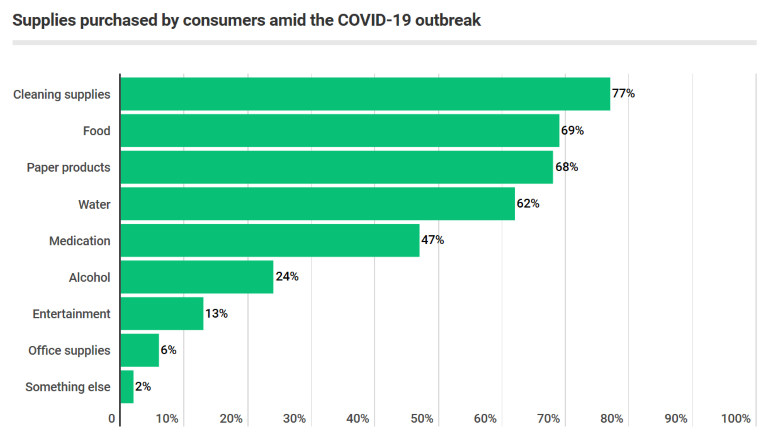As grocery retailers adjust store operations in response to the coronavirus outbreak, Americans are upping their purchases of supplies, with consumers spending an average of $178.44, according to LendingTree.
The Charlotte, N.C.-based online loan marketplace said that 63% of Americans have bought products to prepare for lifestyle changes amid the nationwide spread of COVID-19. Purchases range from food and alcohol to medication and cleaning products.
LendingTree’s study, conducted by Qualtrics, is based on an online survey of 1,050 Americans, including 664 who purchased supplies through March 13.
The most popular purchases among those who stockpiled included cleaning supplies (77%), food (69%), paper products such as toilet paper (68%), water (62%), medication or vitamins (47%), alcohol (24%) entertainment items such as books or movies (13%) and office supplies (6%).
By generation, Millennials spent the most ($195.23) in stockpiling for a coronavirus quarantine, followed by Generation Xers ($179.24) and Baby Boomers ($150.88).

Source: LendingTree survey of 1,050 Americans, including 664 who purchased supplies as of March 13, 2020.
“If you’re wondering who may be to blame for a toilet paper shortage at your local supermarket, one generation outspent the rest when it comes to paper products: Baby Boomers. Eight in 10 Baby Boomers who stockpiled supplies admit to buying paper products during their shopping excursions,” LendingTree said in its study. “Millennials, meanwhile, admitted to buying cleaning supplies (77%), food (70%), water (67%), paper products (62%) and medication/vitamins (54%). Compared with other generations, they also spent the most on entertainment, such as games, books and movies. Gen Xers spent the most on a different type of entertainment: alcohol (29%).”
“Our survey found that earners in the top two income tiers ($75,000 and above) had an edge while buying COVID-19 provisions, spending over $200. Most Americans spent less than $180, and Americans who earned less than $25,000 spent closer to $150,” LendingTree noted.
“It’s expensive having kids, even more so while preparing for an emergency,” the study said. “In contrast to child-free Americans, parents of young children spent more while stockpiling for a coronavirus outbreak.”
Consumers’ rush to build up an emergency supply of food and other essentials — emptying store shelves in various categories — has grocery retailers instituting various changes, primarily around operating hours.
Source: Supermarket News





